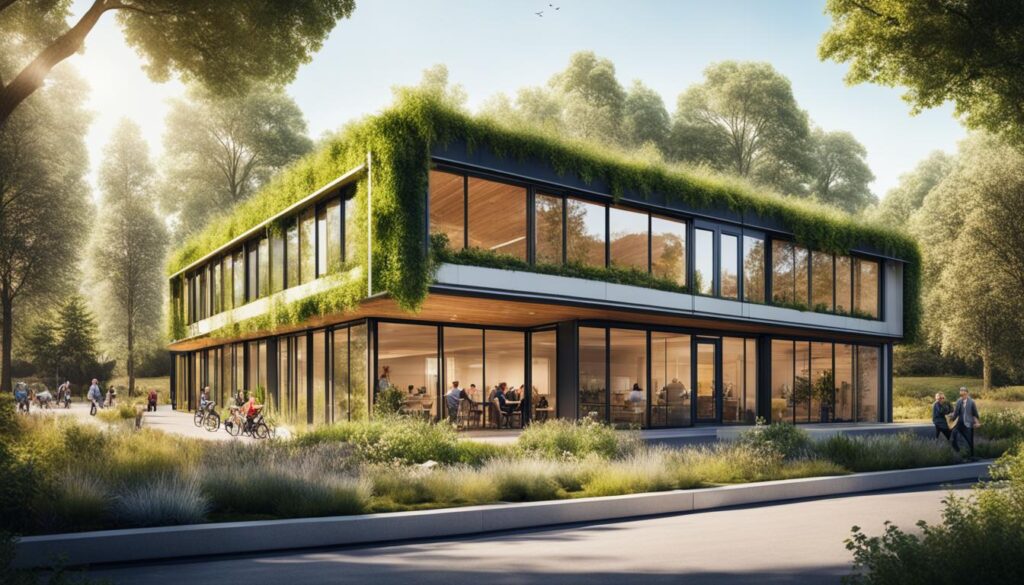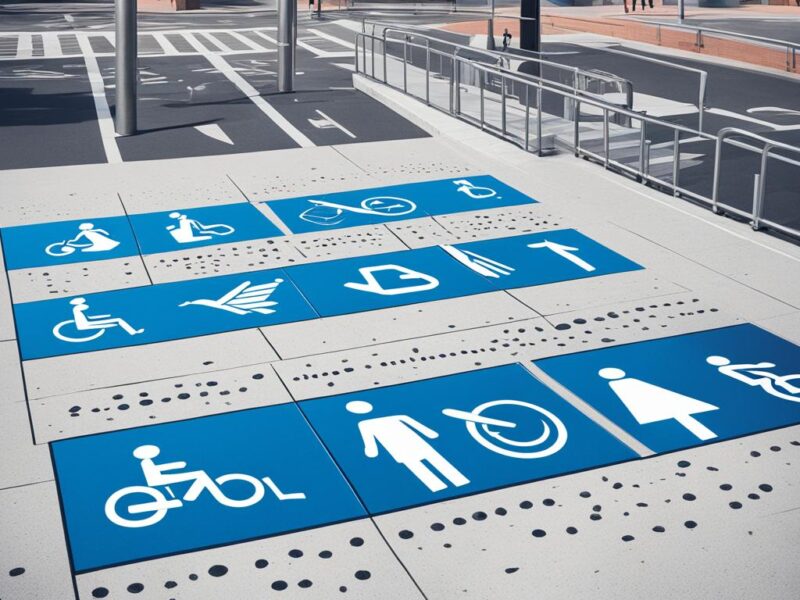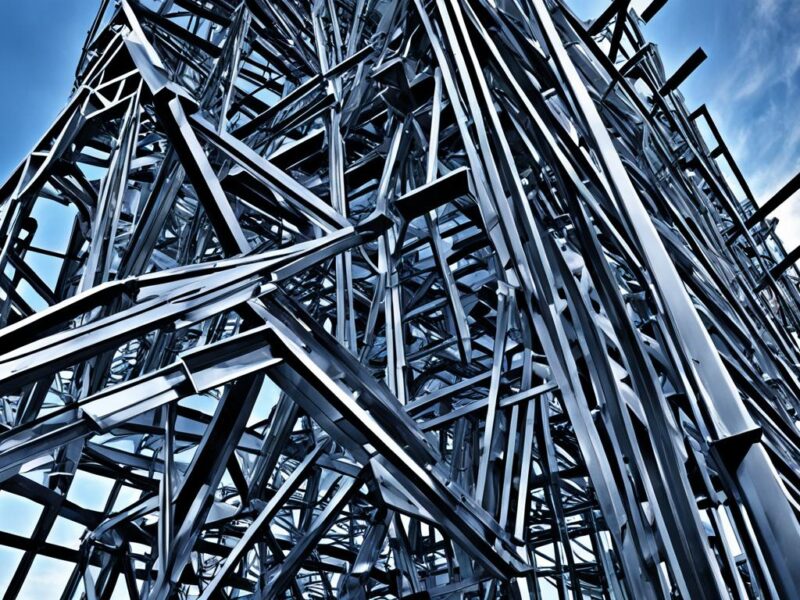
Exploring the Supply Chain of Modular Construction
Modular construction is revolutionizing the building industry, offering a more efficient and sustainable approach to construction projects. By understanding the supply chain of modular construction, we can uncover the key factors that contribute to its success and the benefits it brings to the table.
Modular construction involves constructing building components in a controlled off-site environment and assembling them on-site. This method ensures better quality control, reduced costs, increased efficiency, and sustainability throughout the construction process.
In this article, we will delve into the intricacies of the supply chain behind modular construction, highlighting how it enhances efficiency from procurement to distribution.
Key Takeaways:
- The supply chain of modular construction plays a vital role in its success.
- Modular construction offers better quality control compared to traditional construction methods.
- Reduced costs are a significant advantage of modular construction.
- Modular construction is highly efficient, optimizing timelines and reducing delays.
- Embracing modular construction can lead to sustainable building practices.
Better Quality Control in Modular Construction
Modular construction offers significant improvements in quality control compared to traditional construction methods. With the construction of prefabricated units taking place in a controlled factory setting, the risk of weather-related damage is mitigated, ensuring a higher quality end product. Furthermore, modular construction utilizes high-quality materials that are carefully selected and inspected prior to installation, ensuring durability and longevity.
The shorter construction timeline for modular homes also contributes to better quality control. By reducing the time spent on-site, modular construction minimizes the exposure of the building components to the elements. This reduces the likelihood of issues such as water leakage, which can compromise the quality of the structure. The controlled factory environment allows for meticulous quality checks at every stage of the construction process, ensuring that each module meets the highest standards.
Modular construction enables precise quality control by optimizing construction conditions and utilizing standardized manufacturing processes.
Overall, modular construction’s emphasis on controlled factory production and shorter on-site construction timeframes enhances quality control, resulting in structures that are consistently built to the highest standards.
| Benefits of Better Quality Control in Modular Construction: |
|---|
| 1. Consistency in construction quality |
| 2. Increased durability and longevity of structures |
| 3. Minimized risk of weather-related damage |
| 4. Reduced issues with water leakage |
Reduced Costs in Modular Construction
Modular construction offers significant cost-saving advantages compared to traditional construction methods. By leveraging the efficiency of pre-assembly in a factory environment, builders can access all the necessary components at once, reducing both time and costs. This streamlined approach eliminates many of the uncertainties and delays associated with on-site construction, resulting in substantial savings.
One of the key factors contributing to reduced costs in modular construction is the elimination of on-site construction workers. With the majority of the building process taking place in a controlled factory setting, there is less need for a large on-site workforce. This not only minimizes labor costs but also reduces the risk of costly errors or rework.
Furthermore, the factory production of modular components allows for better cost control and management. Builders can implement standardized processes and materials, optimizing efficiency and reducing material waste. The controlled environment of the factory also ensures that construction is not hindered by adverse weather conditions, which can lead to delays and increased costs in traditional construction.
Overall, the reduced costs associated with modular construction make it an attractive option for many construction projects. By streamlining the construction process, minimizing labor requirements, and optimizing material usage, modular construction offers a cost-effective solution without compromising quality.
Increased Efficiency in Modular Construction
Modular construction is revolutionizing the building industry by offering increased efficiency throughout the entire construction process. From initial design to final implementation, modular construction streamlines every step, resulting in faster delivery times and fewer delays. By adopting this innovative approach, construction companies can optimize timelines, reduce costs, and improve overall project productivity.
One of the key factors contributing to the increased efficiency of modular construction is the use of offsite manufacturing. Each component of the building is meticulously crafted in a controlled factory environment, ensuring precision and quality. This method eliminates the need for on-site construction, minimizing the risk of error and reducing the time required for corrective measures.
Furthermore, the modular construction process allows for simultaneous production and installation. While one component is being manufactured, another can be assembled onsite, resulting in an overlapping workflow that significantly reduces construction time. This approach ensures that project milestones are achieved promptly, enabling faster project completion and accelerated return on investment.
Modular construction’s increased efficiency is not limited to the construction phase alone. Its benefits extend to the entire supply chain, optimizing coordination among suppliers, shipping companies, and contractors. With modular construction, all parties involved can align their timelines and resources more effectively, reducing stress and enhancing overall project coordination.
In addition to time savings, modular construction also offers improved material management. Precise planning allows for optimal resource allocation, reducing waste and promoting sustainability. By utilizing materials more efficiently, construction companies can lower costs and minimize their environmental impact.
To illustrate the improved efficiency of modular construction, consider the following table:
| Comparison | Traditional Construction | Modular Construction |
|---|---|---|
| Construction Time | Months to Years | Weeks to Months |
| Project Cost | Higher due to lags and delays | Lower due to streamlined process |
| Quality | Varies depending on on-site conditions | Consistent due to controlled factory environment |
Table: Comparison of Traditional Construction and Modular Construction
As demonstrated by the table, modular construction offers significant time and cost savings, along with consistently high quality. These advantages contribute to increased efficiency, making it a preferred choice for construction projects of all scales.
Modular Construction Boosts the Supply Chain
Modular construction has revolutionized the traditional supply chain in the construction industry. By utilizing prefabricated units instead of conventional building materials, modular construction enhances the efficiency and effectiveness of the supply chain. This innovative approach eliminates the need for temporary on-site buildings and extra storage space, significantly reducing logistical challenges and costs.
The flexibility in space provided by modular construction allows companies specializing in both modular construction and supply chain management to optimize their services. By streamlining the delivery and installation of prefabricated components, these companies can ensure on-time project completion and efficient utilization of resources. This seamless integration facilitates smoother operations and enhances the overall performance of the supply chain.
One of the significant advantages of modular construction is its ability to keep costs low throughout the entire process. By reducing the time required for on-site construction and minimizing the labor force, modular construction mitigates the risk of cost overruns. Moreover, the availability of pre-assembled modules reduces the need for time-consuming and costly transportation of raw construction materials.
In addition to cost savings, modular construction offers several environmental benefits that align with sustainability objectives. By optimizing the supply chain, modular construction minimizes the environmental impact associated with traditional construction methods. The efficient utilization of resources and reduction in waste contribute to a more sustainable and eco-friendly approach to building.
“Modular construction has significantly improved the efficiency and reliability of our supply chain. By utilizing prefabricated components, we have been able to streamline our construction processes and deliver projects on time and within budget.”
By embracing modular construction, construction companies can optimize the supply chain, resulting in improved efficiency, cost savings, and reduced environmental impact. This transformative building method offers a flexible and sustainable solution for construction projects of all scales.
| Traditional Construction | Modular Construction | |
|---|---|---|
| Space Utilization | Temporary on-site buildings and additional storage space are required. | Prefabricated units reduce the need for temporary structures and excess storage. |
| Logistical Challenges | Transportation and coordination of various building materials can cause delays. | Pre-assembled modules streamline delivery and minimize logistical challenges. |
| Labor Force | Large on-site labor force required for construction. | Modular construction reduces the need for extensive on-site labor. |
| Costs | Higher costs due to labor, material, and transportation expenses. | Cost savings from reduced labor, shorter construction timeline, and optimized transportation. |
| Environmental Impact | Higher carbon emissions and waste associated with traditional construction. | Modular construction minimizes waste and reduces environmental impact. |
Sustainability Benefits of Modular Construction
Sustainability is a key consideration in the world of construction, and modular construction offers numerous benefits in this regard. By adopting modular construction practices, builders can contribute to a more sustainable future by minimizing their environmental impact and promoting eco-friendly practices.
One of the primary sustainability benefits of modular construction is the reduction in pollution. The controlled off-site manufacturing process significantly reduces on-site waste and emissions associated with traditional construction methods. Modular construction allows for precise material usage, minimizing waste and ensuring that resources are used efficiently.
Furthermore, modular construction reduces the number of trucks needed for transportation. Since the components are manufactured in a factory and transported to the construction site, there is a significant decrease in on-site vehicle traffic and associated pollution. This not only improves air quality but also reduces noise pollution in the surrounding areas.
Modular construction’s focus on sustainability extends beyond transportation and pollution reduction. By allowing multiple modules to be built simultaneously, the need for high transportation costs for raw materials is eliminated. This streamlined construction process reduces the carbon footprint traditionally associated with construction projects.

Eco-Friendly Materials
Modular construction also promotes the use of eco-friendly materials. With sustainability at the forefront, builders can choose materials that are environmentally responsible, ranging from recycled materials to renewable resources. This commitment to sustainable materials not only reduces the environmental impact but also ensures healthier living spaces for occupants.
Modular construction is paving the way for a greener future in construction. By adopting sustainable practices and considering the environmental impact, builders can construct high-quality buildings that meet the needs of the present without compromising the needs of future generations.
Energy Efficiency and Conservation
In addition to using eco-friendly materials, modular construction facilitates energy efficiency and conservation. The off-site manufacturing process allows builders to incorporate energy-efficient features and systems into the modules, reducing overall energy consumption. Additionally, the precise construction and sealing of the modules minimize air leakage, improving insulation and reducing energy waste.
With energy efficiency at the core of modular construction, builders can construct buildings that not only contribute to a greener environment but also offer long-term cost savings for occupants through reduced energy bills.
A Sustainable Choice
Modular construction embodies sustainability in its core principles. By minimizing waste, reducing pollution, and promoting energy efficiency, this construction method aligns with the growing demand for environmentally conscious practices in the industry. As more builders and developers embrace modular construction, the positive impact on the environment becomes increasingly significant.
Embracing modular construction is not only a smart business decision but also a responsible choice that contributes to a more sustainable future for generations to come.
Conclusion
The supply chain is a critical aspect of modular construction, and understanding its impact is key to harnessing the benefits of this construction method. By implementing modular construction, companies can enjoy improved quality control, reduced costs, increased efficiency, and enhanced sustainability. With a faster construction timeline and minimized weather-related delays, modular construction offers a reliable and efficient solution for building projects.
Embracing the modular construction supply chain can lead to significant efficiency improvements in the procurement and distribution processes. By eliminating the need for on-site construction workers and optimizing the use of prefabricated components, costs can be saved at various stages of the supply chain. Moreover, the sustainability benefits of modular construction, such as reduced pollution and minimized transportation, make it an environmentally friendly choice.
To achieve these benefits, it is crucial for construction companies to integrate modular construction into their supply chain management strategies. By collaborating with suppliers specializing in modular construction and adopting efficient logistical practices, companies can optimize their operations, enhance productivity, and achieve cost savings. The modular construction supply chain offers a versatile and sustainable approach to building projects, making it a desirable choice for those seeking efficiency and environmental-conscious solutions.







